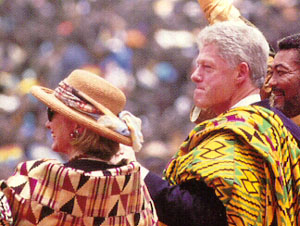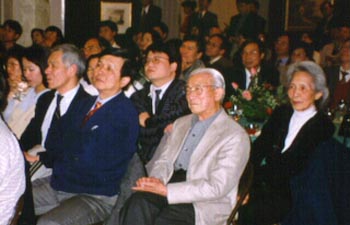 Taiwan
Communiqué No. 80, April 1998
Taiwan
Communiqué No. 80, April 1998 Taiwan
Communiqué No. 80, April 1998
Taiwan
Communiqué No. 80, April 1998 |
| Mr. Clinton in Africa: when will he visit Taiwan? |
Barring unforeseen events, in June 1998 US President Clinton will travel to China. This will be a major opportunity for Mr. Clinton to show statesmanship by urging the Chinese to welcome Taiwan as a free, democratic and independent neighbor.
Like Martin Luther King, we Taiwanese have a dream that the principles of freedom, democracy and self-determination are finally being adhered to, and that our nation is accepted by the international community as a full and equal member.
We have a dream, that the Chinese stop perpetuating the hostility and
rivalry dating from the Chinese Civil War with the Kuomintang. That peace
and stability settles across the Taiwan Straits, and that Taiwan and China
can live next to each other as two friendly neighboring nations.
Mr. Clinton needs to extricate the United States from the muddled swamp of three decades of the Kissingeresque creatively ambiguous "One China" policy, and move unambiguously to a new and clear policy which celebrates the achievement of democracy by the people of Taiwan, and welcomes them as a new nation in the international community.
Until now, Mr. Clinton has attempted to expedite relations with China at the expense of Taiwan's future, and has perpetuated the anachronistic "One China" policy: in October 1997, during the visit of Chinese president Jiang Zemin he stated his "...continuing support for our one China policy, which has allowed democracy to flourish in Taiwan....The Taiwan question can only be settled by the Chinese themselves peacefully."
This statement displays a fundamental lack of understanding of the basis issue: saying that the Taiwan question can only be solved "by the Chinese themselves" is as much a misnomer as saying that the question of the United States should be resolved by the British themselves. The majority of the people in Taiwan consider themselves Taiwanese, just like Americans consider themselves Americans and not British.
In addition: our democracy was the result of the hard work of the Taiwanese people, and didn't have anything to do with the "One China" policy. If anything, democracy in Taiwan came about in spite of the "One China" policy.
A U.S. policy that would attempt to preclude Taiwan's road to independence and its full membership in the international community represent the worst kind of meddling in Taiwan's future. We reject such a policy out of hand. It disregards the basic principles of self-determination and democracy which are enshrined in the Charter of the United Nations and which constitute (we presume !!) the basis for U.S. foreign policy.
We urge Mr. Clinton strongly to make it crystal clear that the United States supports that:
Such a new policy would enhance peace and stability in East Asia, because it would finally end the decades-old hostility between the Kuomintang authorities on Taiwan and the Communists in the PRC.
While we are not against a dialogue between China and Taiwan, we believe that such a dialogue can only be held 1) if the Beijing leaders show some readiness to accept Taiwan as a friendly neighboring state, and 2) if there is a broad consensus on Taiwan on the future of the island.
Such a consensus can only be achieved if the people on the island can express themselves freely and openly on the issue of their future without any Chinese threats and interference, with missiles or otherwise.
From 17-19 March 1998, Taipei Mayor Chen Shui-bian visited Washington, meeting with members of Congress, US government officials, representatives from various think-tanks and the press.
He emphasized during the visit that the people of Taiwan have the right to determine their own future, and urged the United States to continue its support of the newly democratic island, certainly if China again threatens to attack Taiwan.
The first mayor of Taipei from the opposition Democratic Progressive Party (DPP) to visit Washington, Mr. Chen also said in his speeches that the Taiwan issue is not an internal problem — as the PRC usually claims — but an international issue with important ramifications for stability in East Asia.
Mayor Chen, widely regarded as a potential DPP candidate for the 2000 presidential election, pointed out that the people of a democratic country are entitled to decide on their own the future of their country and to choose their way of life. "I think any country which deems Taiwan as part of the People's Republic of China has not listened to the voice of the people of Taiwan," he observed.
Noting that the United States is a nation which holds democratic principles high, Mayor Chen said he is convinced that it will respect and accept any decision reached by the people of other countries through democratic procedures. The charismatic mayor further said he doesn't think it is in the US interest if China uses military force to attack Taiwan again and disrupt stability in East Asia.
Mr. Chen also rejected the views of former US Assistant Secretary of Defense Joseph Nye, who advocated in a recent article in the Washington Post that the United States should somehow make a three-way deal in which Taiwan would give up its independence in exchange for some vague Chinese promises to leave Taiwan some international breathing space.
US government officials and former officials — most recently Mr. Anthony Lake during a visit to Taiwan — emphasized that Mr. Nye's opinions do not reflect US government policy.
 |
| Attentive audience in Washington, listening to mayor Chen |
Mr. Chen said he was aware of Nye's viewpoints, but was assured that Nye's article only reflects his personal opinion and doesn't represent the official US policy. "During my talks with many American scholars, experts and politicians, I have never heard opinions similar to Nye's," Chen said. He added that the proposals conflicted both with the basic principles of human rights and self-determination, as well as with the "six assurances" the United States gave to Taiwan in 1982 when Washington signed the so-called "August 17" joint communiqué with China.
Those six assurances include promises that the United States will neither set a deadline for arms sales to Taiwan nor consult in advance with Beijing on such deals with Taiwan; it will not act as a go-between for the two sides of the Taiwan Strait; it will not revise the Taiwan Relations Act; it will not change its stance on the issue concerning Taiwan's sovereignty; and it will not pressure Taiwan to negotiate with mainland China.
Asked about whether he thinks Washington has set any limits or conditions on its commitment to Taiwan's security, Chen said that to his knowledge, the US stance on the 1982 "six assurances" has remained unchanged.
Chen also said the DPP hopes that the United States will upgrade cooperation with Taiwan in satellite defense systems. On economic relations across the Taiwan Strait, Chen said if the DPP comes to power, it will consider levying a "national security tax" on Taiwan companies which have invested in mainland China and that the tax rate will depend on Beijing's attitude toward Taipei. "We'll also push enterprises controlled by the ruling Kuomintang to privatize and adopt measures to reduce our trade surplus with the United States if our party takes the helm," he added.
During his visit, Mayor Chen attended a Heritage Foundation-sponsored lunch meeting where he exchanged views with several American China hands and close aides of some US congressional members on Taiwan's latest political developments and cross-strait relations. He also paid a visit to the Atlantic Council, also a private think tank.
After visiting Washington DC, Mayor Chen went to New York, when he met with mayor Giuliani, and had interviews with both Newsweek and the New York Times editorial board.
In his interview with Newsweek, published in the International edition of 22 March 1998, Mr. Chen emphasized that the people of Taiwan want to determine their own future, and do not want to be ruled by the Chinese Communists. He rejected the Hong Kong "One Country, two Systems" approach as a model for Taiwan. He also stated that China was not sincere in pushing for "political talks", calling it "lip service."
Back to: Table of Contents
Copyright © 1998 Taiwan Communiqué